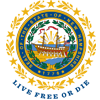New Hampshire Agriculture COVID-19 Relief Fund
Information on Agriculture COVID-19 Relief Fund.
The Governor has authorized the allocation and expenditure of $10 million from the CARES Act Coronavirus Relief Fund to support New Hampshire farms that have experienced negative financial impacts due to COVID-19. Scifically, the Governor has authorized $4.5 million to dairy farms for declining milk prices and lost milk production; $2.5 million to non-dairy farms, in order to ease the burden of substantial new COVID-19-related costs like extra cleaning and sanitizing, ensuring social distancing, and lost sales; and $3 million for emergency grants to ensure the stability of food supply. The $2.5 million to non-dairy farms includes $1.5 million for specialty crop producers that had at least $50,000 of 2019 gross sales (“Registered Farm Program”), and $1 million for non-dairy farms generally (“Expanded Farm Program”). The New Hampshire Department of Agriculture, Markets and Food (“Agriculture”) administers these programs.
Non-Dairy Farms
Registered Farm Program
This program supports specialty crop producers, including fruit, vegetable, and ornamental plant growers, and maple producers, based on COVID-19-related expenses and/or lost sales, provided that they: (1) had at least $50,000 of 2019 gross sales; and (2) registered for the program by June 22, 2020. If an otherwise qualifying farm did not register by June 22, 2020, it cannot apply for relief through this program.
An eligible farm may submit up to three applications, one for each of three separate time periods. However, if a farm does not submit an application by the deadline, it cannot receive relief funding for any COVID-19-related expenses and/or lost sales incurred during the applicable time period.
The first application period for losses incurred during the period from March 1, 2020 to June 30, 2020 began on June 25, 2020 and ended on July 15, 2020. The next application deadlines are:
- October 15, 2020, for expenses and/or lost sales incurred during the period from July 1, 2020 to September 30, 2020; and
- December 10, 2020, for expenses and/or lost sales incurred during the period from October 1, 2020 to November 30, 2020.
The amount of any grant will be calculated according to the following formula:
- 100% of COVID-19-related expenses during the application period, except labor costs and capital purchases;
- 50% of COVID-19-related labor costs up to the amount of any year-over-year sales increase, or 100% if no sales increase or for any amount over the increase;
- 25% of any allowable COVID-19-related capital purchases; and
- 100% of COVID-19-related lost sales from 2019 to 2020 during the application period, if perishable items, or 50% if non-perishable items.
Although a registered farm is a specialty crop producer at least in part because of the original non-dairy farm program requirements, both the Registered Farm Program and Expanded Farm Program consider lost sales of non-value added agricultural products in addition to specialty crops.
Expanded Farm Program
This program generally supports non-dairy farms that cannot apply through the Registered Farm Program, whether because they are not specialty crop producers, had less than $50,000 of 2019 gross sales, or missed the registration deadline. Instead, the Expanded Farm Program has a much lower, application period-specific threshold based on COVID-19-related losses. Specifically, a farm is eligible to apply for relief funding, if, during the applicable time period, the farm had average COVID-19-related expenses of at least $500 per month, or average COVID-19-related lost sales of at least $1,000 per month. For example, if, during the period from October 1, 2020 to November 30, 2020, a farm had COVID-19-related expenses totaling $1,000 or lost sales totaling $2,000, the farm would be eligible to apply for relief funding. The significantly lower threshold makes agriculture relief available to smaller farms, while ensuring it still helps those most in need of financial assistance.
Like the Registered Farm Program, the Expanded Farm Program is based on COVID-19-related expenses and/or lost sales using the same formula, and eligible farms may submit up to three applications for the same time periods (but without having to register ahead of time). If a farm does not submit an application by the deadline, it cannot receive relief funding for any COVID-19-related expenses and/or lost sales incurred during the applicable time period.
The first application period for losses incurred during the period from March 1, 2020 to June 30, 2020 began on August 6, 2020 and ended on August 31, 2020. The next application deadlines are the same as the Registered Farm Program’s deadlines/periods, specifically:
- October 15, 2020, for expenses and/or lost sales incurred during the period from July 1, 2020 to September 30, 2020; and
- December 10, 2020, for expenses and/or lost sales incurred during the period from October 1, 2020 to November 30, 2020.
Non-Dairy Farm Grant Agreement Terms and Conditions
Dairy Farms
This program provides support for dairy producers on a monthly basis, up to a total of $4.5 million. Agriculture makes both monthly and quarterly payments, monthly for declining milk prices and quarterly for lost milk production. The monthly payment for COVID-19-related lost revenue from declining milk prices is calculated by comparing the price actually paid for milk shipped into the fluid milk market to the Agri-Mark Northeast Milk Price Forecasts, 2019-2020, dated February 28, 2020, adjusted for: (1) insurance, by subtracting any payout if the dairy farmer had purchased insurance, or the premium amount that the dairy farmer would have paid had it purchased insurance; and (2) federal relief funding. The quarterly payment for COVID-19-related lost revenue from lost milk production is calculated by comparing the amount of milk actually shipped into the fluid milk market to a forecasted amount, based on production during March 2020. Agriculture obtains all of the information necessary to making these payments without requiring any application process.
For more information, or if you have any questions, please contact Gail McWilliam Jellie, Director, Division of Agricultural Development, at (603) 271-3551.
Additionally, due to the uncertainty around the food supply, the Governor’s Office for Emergency Relief and Recovery (GOFERR) will reserve $3 million to make emergency grants should the need arise. In the event that Agriculture determines a specific industry requires support in order to continue production, GOFERR will work with Agriculture to administer aid to that industry consistent with CARES Act guidance.





